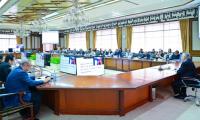Islamabad: The PM’s Special Assistant on Health Dr. Zafar Mirza suspended District Health Officer Dr. Najeeb Durrani here on Friday, allegedly on charges of negligence in the wake of the dengue fever outbreak.
The DHO is said to have invoked the SAPM’s wrath for his failure to provide daily data on dengue fever patients at the Pakistan Institute of Medical Sciences (PIMS), which now bears greater semblance to a protest field than a medical institution.
“I will not tolerate the slightest neglect in the health sector. I am personally chairing the daily review meeting being convened to assess the situation. There will be zero tolerance for negligence or weakness, and close scrutiny and accountability will be done,” Dr. Zafar Mirza remarked earlier while addressing a press conference to disseminate latest disease trends and measures.
Commenting on the suspension, health journalists expressed that the Executive Director of PIMS, rather than Dr. Najeeb, should have been suspended because PIMS has turned into a permanent venue for protesting doctors, consultants, house officers, post-graduate trainees, and non-medical staff, among others, with patient welfare being at its lowest ebb. “It was PIMS that failed to provide timely data to Dr. Zafar for dissemination at the press conference. The staff of the District Health Office has been working round the clock, even on Sundays, for the last over two weeks now,” sources confided.
Coming to latest data, Dr. Zafar shared that 14,015 patients have so far been diagnosed with dengue fever, with 26 deaths. As many as 790 cases have been identified from across the country in the last 24 hours. Of these, maximum number of patients (48 per cent) are from Islamabad and Rawalpindi, where 216 and 165 patients respectively, have been diagnosed with the disease. Next comes Punjab, followed by Khyber Pakhtunkhwa, and Sindh. Sindh has confirmed 120 cases in the last 24 hours; of these, 113 cases have been identified in Karachi, he stated, adding that not all identified patients are hospitalised.
Announcing decisions taken at the daily review meeting that he co-chaired with Punjab’s Health Minister Dr. Yasmeen Rashid to take stock of preventive and curative aspects of response in areas of concern, Dr. Zafar stated that maximum occupancy of hospital beds by dengue fever patients has compromised the treatment of patients suffering from other ailments. “To overcome this issue, we have decided to share beds with the Punjab government, which in turn will share its doctors, nurses and healthcare providers with us. Implementation of this plan will commence within the next 24 hours,” he stated.
Dr. Zafar said that he is closely coordinating with the administration and health managers of Rawalpindi and Islamabad, with whom he convened his first meeting on Friday. The meeting was attended by heads of all hospitals, as well as the commissioner, deputy commissioner, and proctors involved in control of the outbreak. He said the city administrator, coupled with a health management team comprising a curative doctor and a preventive health focal person, will meet on a daily basis to forge better response. Dr. Zafar expressed satisfaction with the overall situation of availability of hospital beds, medicines, and diagnostic kits for hospitalised patients.
The meeting was informed that the Directorate General of Health Services, MCI and ICT Health Department are efficiently conducting larva surveillance and instituting urgent response measures through rapid response teams. Activities in hot spots are being supported by local representatives. Dr. Zafar assured that all possible efforts are underway and that with decreasing temperatures, the number of cases will soon decline.
Dr. Zafar maintained that in parallel with existing efforts, planning has already begun for next year. “Experts from abroad will be called in to study trends of the current outbreak in Pakistan and to guide us on strengthening our institutions and planning processes so that timely measures can be taken to avert such emergencies in the future,” he said. He linked the spike in Dengue Fever cases this year to the prevailing global cycle in all 125 countries that have faced similar outbreaks in the past. “Every 4 or 5 years, these has been an increase in cases. The scenario in Pakistan is also linked with issues related to climate change, poor environmental management, and lacunae in planning,” he identified.
The media was informed that within Islamabad, the affected UCs include Rawat, Koral and Tarlai, while in Rawalpindi, case clustering is observed in Potohar Town including Airport Housing Society, Gulbahar Scheme, Wakeel Colony, Dhoke Munshi and Kot Jabbi. Thanks to increased awareness, people with minor symptoms are also getting themselves tested. In government hospitals of Islamabad, a total of 1,208 patients reported for testing with a positivity ratio of about one-fourth only. On September 26, as many as 222 patients were admitted in government, and 112 in private sector hospitals in Islamabad.
Dr. Zafar urged the public to call the Dengue Control & Operations Cell (051-9216890) for any queries, complaints and suggestions.






